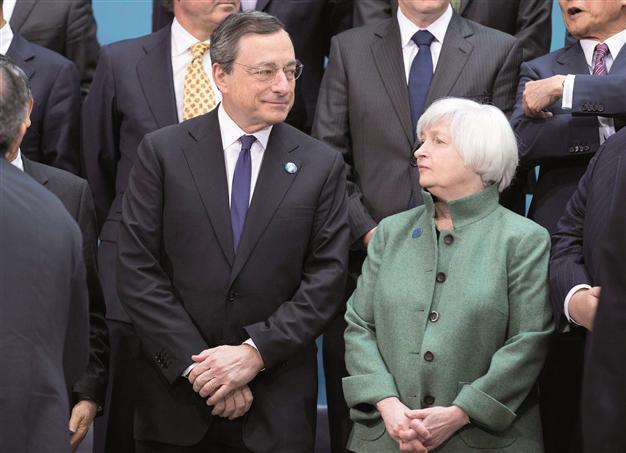No sign of major central banks tightening the reins
LONDON - Reuters

President of the European Central Bank Mario Draghi and US Federal Reserve Chair Janet Yellen speak before the G-20 finance ministers in this April 11 file photo. REUTERS photo
Government bond yields have tumbled on the basis that the world’s major central banks will continue to keep monetary policy easy and in some cases loosen further.
Economic data in the week ahead - most notably May purchasing managers surveys (PMIs) from the United States, China and the euro zone - will be used by investors to test that thesis.
Five senior sources have told Reuters that the European Central Bank is preparing a package of policy options for its early June meeting, including cuts in all its interest rates and targeted measures aimed at boosting lending to small- and mid-sized firms.
A distinctly mixed bag of eurozone GDP data, which showed Germany charging ahead and Spain holding its own but France stagnating and Italy, Portugal and the Netherlands slipping back into contraction, will have done little to dissuade the ECB from moving.
Minutes of the Federal Reserve’s last policy meeting, at which it reduced its monthly bond purchases to $45 billion from $55 billion, will be released tomorrow.
At the April 30 meeting the Fed stuck to its assessment that the economy would need near-zero interest rates for a considerable time after asset purchases are fully wound down by year-end.
The Bank of Japan delivers its latest policy decision also tomorrow and is set to maintain its upbeat view of the economy, suggesting no immediate expansion of stimulus is likely.
Talk of tighter policy is not even in the air and the BOJ is expected to maintain its monetary policy framework.
Recent data from China has shown weakness in output, investment and consumption, raising expectations that the People’s Bank of China will come in with some form of stimulus if Beijing is to meet its 7.5 percent growth target this year.
Until recently, expectations had centered on the Bank of England being the first of the big central banks to tighten policy.
But BoE Governor Mark Carney stressed last week that there was no hurry to raise interest rates, despite the British economy’s fast recovery and the threat of a growing bubble in the housing market.
As investors have got over initial concern about the slowing of Fed stimulus, emerging markets have come back into vogue.
Turkey’s Central Bank has so far resisted Prime Minister Tayyip Erdoğan’s call for immediate rate cuts to start reversing a dramatic increase enacted in January to shore up a tumbling currency.
